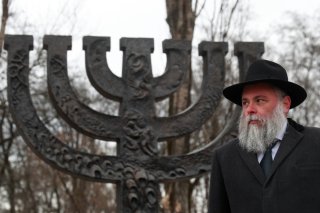We Must Pass the Torch of Holocaust Remembrance
This is the Holocaust survivors’ final decade: there is a burden on all of us to use this precious time to learn everything we can from them and to formulate a way to ensure that the Holocaust will never be forgotten.
One of the fundamental tenets of Holocaust education has always been the power of personal testimony; the idea that the personal story of just one Holocaust survivor can educate thousands on the untold horrors that occurred and of the eternal importance of the message, “Never Again.”
Yet while the power of personal testimony is undiminished, the practicalities of it are becoming harder each year. Today, just 400,000 Holocaust survivors are still alive; nearly 80 percent over the age of eighty. It is sad to say, but within a generation, almost all of them will have passed on.
This has significant implications for Holocaust education as we know it. Courage to Care, an organization I have proudly chaired in New South Wales, Australia, puts survivor testimonies at the heart of its efforts to educate people about the dangers of racism, bigotry, discrimination, and bullying—and to encourage them to become upstanders rather than bystanders. Holocaust institutions around the world are racing against time to ensure that the voices of as many survivors as possible will be heard and preserved, but there is still no adequate substitute for sitting in a room with a survivor and listening to their story.
This, though, is the reality, and it cannot be changed. Because of this, the new focus of Holocaust education has to be on the third generation of Holocaust survivors—those whose grandparents went through the gates of hell and survived. My grandmother, “Babushka Tamara,” was a Holocaust survivor. When she was eleven years old, she was visiting a small village in present-day Belarus with her family. One day her parents told her: “Today you have to stay in bed.” That day, the Jews of the village were taken to the edge of a nearby forest and shot, victims of the “Holocaust by Bullets” in which around 1.5 million Jews were murdered.
Babushka Tamara, though, survived. She couldn’t have done it on her own. She was taken in by a Christian family, the Chosdosevitchs. Later they were murdered by the Nazis, with their little baby, for being part of the resistance that saved my grandmother. Today they are commemorated at Yad Vashem as Righteous Among the Nations. Babushka Tamara was captured again by the Nazis, landing up in a labor camp, before escaping with some Russian soldiers. An incredible story that she never spoke about while she was still alive. I suppose it was too painful, too traumatic. We only know what happened because, one month after she passed away, my mother discovered her memoirs in a shoebox.
I am so grateful that she had the chance to tell her story, but I wish that she had been able to share it with the world while she was alive. And it’s because of her story that I understand the unique responsibility that the third generation has to keep the flame of Holocaust memory alive. It’s inspired me and I hope it can inspire others. We cannot take it for granted that people will continue to understand the Holocaust and its significance. Throughout the pandemic, for example, we have seen anti-vaxxer protesters around the world perversely compare themselves to Jewish victims of the Nazis. This trivialization of the Holocaust is a major threat and can only be combated through robust educational messages.
At the same time, anti-Semitism continues to rage around the world, on and offline. In Texas, a man took hostages at a synagogue because he believed the Jews controlled the world and could secure the release of his sister from prison. Some of the main drivers of this problem are phenomena like Holocaust distortion, Holocaust denial, and Holocaust ignorance.
In the absence of Holocaust survivors, the fight against these trends will become more difficult. After all, there will be no one left to respond with first-hand experience to the fallacious claims of the deniers. Yet despite the challenges, I am optimistic. The success Holocaust educational institutions have had in recording the testimonies of survivors, combined with the growth in technology and the ongoing increase in historical understanding, means that we have powerful means at our disposal to fight back against the hate and lies.
The mission, though, is more important than ever. This is the Holocaust survivors’ final decade: there is a burden on all of us to use this precious time to learn everything we can from them and to formulate a way to ensure that the Holocaust will never be forgotten, even if the survivors are no longer around to talk about it. Because of this, I am proud and humbled to be representing the third generation at this year’s March of the Living, and to help in the passing of the responsibility of remembering the Holocaust from the survivors’ generation to their grandchildren’s generation.
The medium and the messengers are changing; but the mission and the message remain the same.
Eitan Neishlos is a grandson of a Holocaust survivor, Founder & Chairman of The Neishlos Foundation, and a strategic partner to the March of The Living.
Image: Reuters.

